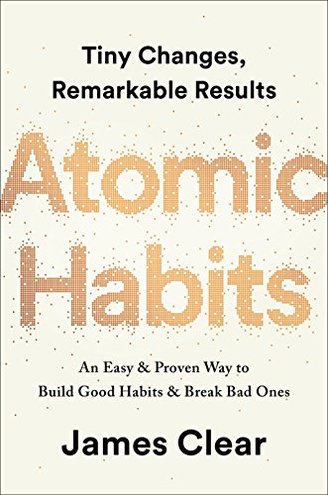Review of ATOMIC HABITS
by Johny McFliggen, PhD Literature & Business, Oxford
Ah, "Atomic Habits" by James Clear—the darling of the self-help world, the book that's whispered about in coffee shops and boardrooms alike. It's as if it has become the holy grail for those seeking transformation through minuscule changes. Clear's thesis is both revolutionary and gloriously obvious: tiny habits can lead to monumental outcomes. It's like watching a single domino topple an entire line; the magic is in the compounding effect.
Clear's "Four Laws of Behavior Change" form the skeleton of his habit manifesto. The laws themselves—make it obvious, make it attractive, make it easy, make it satisfying—sound like the kind of advice your grandmother might give, yet they are undergirded by Clear's thorough research and nods to behavioral science. It's the type of wisdom that feels both novel and ancient, like a rediscovered artifact that was hiding in plain sight.
The book's charm lies in its simplicity and the author's ability to distill complex psychological concepts into digestible nuggets. James Clear, with his unassuming background in human behavior, doesn't overcomplicate things. Instead, he offers a manual that reads like a friendly nudge rather than a stern lecture. It's not unlike watching Bob Ross paint: soothing, methodical, and surprisingly effective.
However, amidst all the praise, one must concede that "Atomic Habits" doesn't venture into uncharted waters. It treads familiar paths blazed by predecessors like Charles Duhigg's "The Power of Habit." Duhigg provides a more scientific exploration of habits, whereas Clear offers a practical toolkit for personal application. If Duhigg is the scientist in the lab, Clear is the handyman with a toolbelt—both have their place, but they serve different purposes.
Comparisons don't stop there. Stephen Covey's "The 7 Habits of Highly Effective People" provides a broader philosophical approach to effectiveness, whereas Clear narrows his focus to the granular mechanics of habit formation. And while Carol Dweck's "Mindset" revolutionizes how we perceive potential and growth, Clear provides the step-by-step guide on how to get there through small wins.
Critics might argue that Clear's advice isn't groundbreaking. Indeed, the core concepts have been whispered through the corridors of behavioral science for decades. Yet, there's a reason this book finds itself on bestseller lists—it resonates. It's a testament to Clear's ability to take well-trodden ideas and breathe new life into them with clarity and precision.
In the end, "Atomic Habits" is like that deceptively simple tune you can't get out of your head—it's catchy because it's true. In a world that constantly sells us on radical overnight transformations, Clear's approach is refreshingly sane. It's about becoming one percent better every day—a concept so elegantly simple that it feels revolutionary. Whether you're looking to quit smoking or become the next Mozart, James Clear argues that the path is paved with tiny habits, each one leading inexorably to greatness. For those willing to listen, "Atomic Habits" is not just a book—it's a blueprint for life.
Purchase Link: ATOMIC HABITS on Amazon
